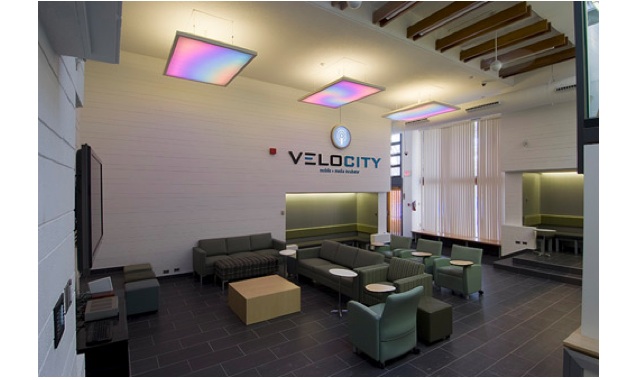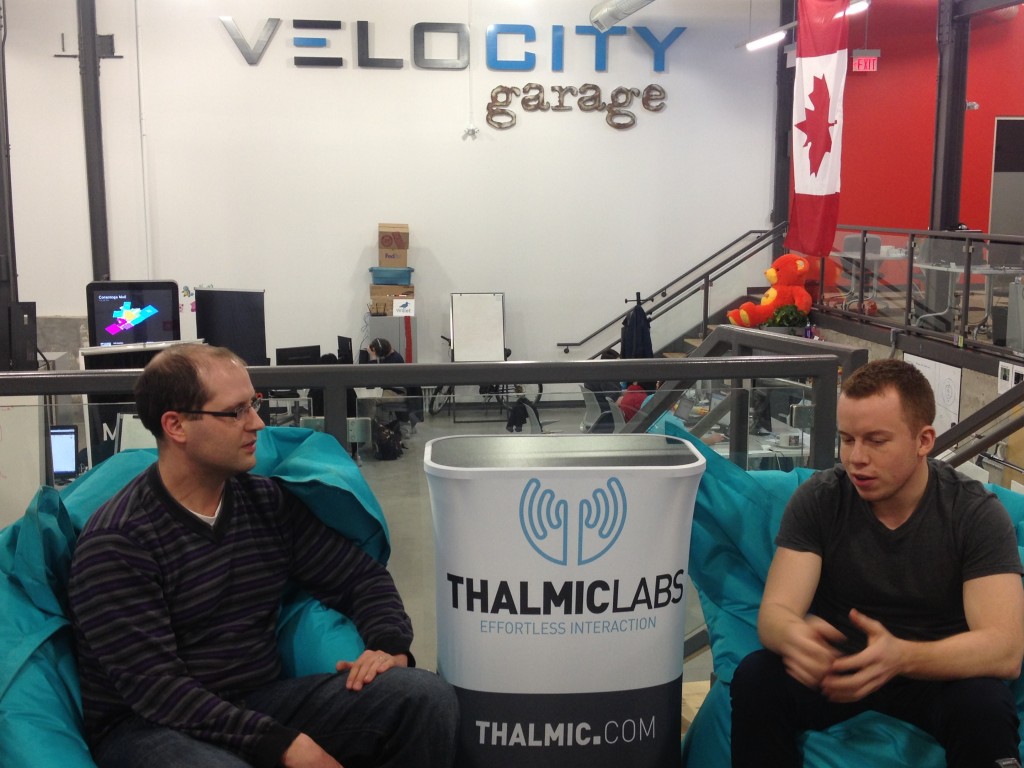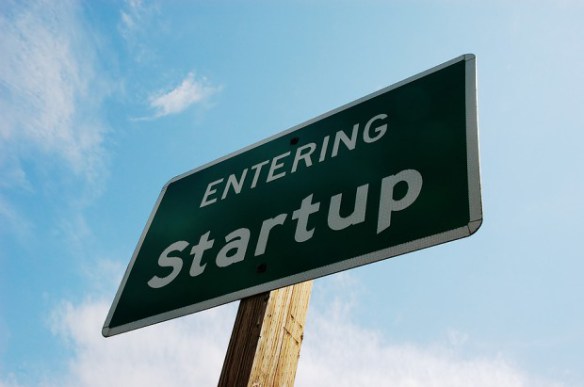Interview with Matthew Bailey of Thalmic Labs
Hamilton-native Matthew Bailey is a co-founder of Thalmic Labs (@thalmic), a company that is consistently ranked not only as Canada’s hottest startup but also as one of the top startups to watch worldwide. Their MYO gesture control armband uses arm muscle activity and EMG signals to control digital devices over Bluetooth. MYO has over 30k in pre-sales at $149 each and they have recently closed a $14.5 million Series A round of investment to turn MYO into the next big thing in gesture control. Thalmic Labs was incubated in the Velocity program at University of Waterloo, along with other successful Waterloo-area startups such as BufferBox and Kik.
As we saw at last night’s DemoCamp, student entrepreneurism has been on the rise in terms of quantity and quality several years now at McMaster University. For example Nix Sensor being able to raise $70k on Kickstarter, or Woof reaching 20k users just 2 weeks after launch. But as Waterloo is showing us, there’s potential for more. That’s why I was happy to talk to Matthew about his own experiences in the field, with Thalmic Labs, and at Velocity. Check out the interview below:
 How did you first become interested in a career in technology?
How did you first become interested in a career in technology?
I have always been interested in robotics. My parents bought me Lego Mindstorms at a young age. My dad got me to learn how to program PLC’s and then had me start to learn how to use AutoCAD. In highschool, I began doing AutoCAD competitions and became even more interested in robotics. I applied to the Mechatronics program at UW as that was the most relevant to my interests. Throughout my co-op experiences, I began realizing that I wanted to try to start a company on my own. The Mechatronics program gives you a high level of knowledge in mechanical, electrical, and computer engineering, the perfect combination to be able to create a hardware device. We did a few complex projects that had us create full hardware/software systems that gave me the confidence that I could do this on my own. I found the right group of guys in my program who shared the same desire to start a company, and we began working on it upon graduation.
Do you feel your secondary school education at Bishop Tonnos here in town was able to develop your early interest? Do you have any thoughts on how to improve early technology education?
I do. As I said, I participated in AutoCAD competitions at BT, and this was lead by my tech teacher, Mrs. Fede. She identified my skill with the program out of the class and personally took me to the competitions. This really sparked my interest in mechanical design and cultivated my talent in its main software suite. Leading the mechanical department is one of my main duties at Thalmic Labs.
I would add more projects within the school system that focus on using software, coding, and building electro-mechanical systems at the appropriate skill level that have cool and tangible results to get kids interested in this at a young age. A perfect example is First Robotics. Unfortunate, BT did not have this program, but the co-op students that I have hired that participated in this are way more knowledgeable and effective at a younger age than anyone else because of this exposure.
How did the idea for Thalmic Lab’s MYO originate?
Steve and I created a device called EAVI (Electronic Aid for the Visually Impaired) for our fourth year design project. This device was a belt that has a LIDAR mounted to the front of it that scans the area in front of the user and translates obstacles to haptic feedback on the users stomach. The user would be able to feel their way around the world. It also had a head mounted camera and a set of speakers that could identify friends and road signs and then announce them to the user using sound localization. The device was self contained and had no form of tethering.
Using technology to restore some abilities to the disabled got us thinking that maybe we could use technology to give us abilities that we dont currently have. We looked at where the computing industry is going, and there is a strong push towards wearable technology. Lots of companies have created great output modalities like the Google Glass, but no one has figured out a good way of interacting with this technology. We thought it would be really cool if we could somehow just control this wearable technology with no perceived “controller” from another persons view. This is how we arrived at the Myo.
What can you tell us about the work being done on MYO?
We are working hard on creating the best possible user experience for the Myo. As it is a new interface method, there are a lot of things that we have to get right in order for it to become adopted by the general consumers. We are making it easy to develop for, easy to use and robust in design.
Thalmic Labs is an alumni of the Velocity program at the University of Waterloo. What is the Velocity program about?
Velocity is all about giving bright students coming out of the University of Waterloo an environment that cultivates and nurtures their ideas either to the point of success, or to the point where a decision can be made not to pursue it anymore. This is all done free of charge, which is critical for its success. People say students are starving, but entrepreneurs coming straight out of school typically have debt, can’t get OSAP, and turn down paying job offers to pursue their passions, so definitely cannot afford to pay for space. They put upwards of 30 startups all in one big room, with the only rule that they have to be hitting their own defined milestones on a monthly basis.
What type of support did the Velocity program offer Thalmic Labs?
The help and mentorship from the other startups in the program is one of the most valuable aspects of the program. There are startups that are older and younger, have been through similar problems, and are working just as hard, so there is a real sense of community and a very supportive environment that has been created. It is always the same crowd of people that are in there every day, and they are all working the 13 or 14 hour day as well, so it encourages you to keep going at it no matter what problems you may face. This is key in getting your startup to the point of success, as you will inevitably have a long list of failures that led up to that.
The Velocity team provides support in all aspects of the startup cycle. From beginning the company and figuring out equity splits and incorporation, to creating a business plan and determining product strategy, to launching a product and figuring out how to market it properly, they have a talented list of advisers who will help in any way they can. They regularly bring in notables from the startup community like Alexis Ohanian or Dan Martel at free dinners to give the startups words of advice and to tell their stories. They keep the facility open 24 hours with an endless supply of coffee,
How important was the Velocity program for the success of Thalmic Labs? What do you think are the most important aspects of programs like Velocity in terms of creating more successful student startups?
It was critical in our success. The love we received from the Velocity staff, the help from the other startups, and the amazing work environment, all helped us get to where we are right now. We owe a lot to that program. Every company that graduates from there will say the same, and they always keep very close ties and try to give back to the program in any way they can. They had to put up with a lot from us. As a hardware startup, we require a different set of tools than a software startup. We built a huge electronics lab in the space, bought 3D printers, put acid baths for 3D parts in some of the washrooms, took over a room to ourselves in another area of the building, set up a server farm (loud). A successful company before us, Bufferbox, manufactured all of their boxes in the Velocity garage. The fact that they are willing to accommodate companies in any way, shape or form to allow them to get what they need to get done will always be remembered and appreciated by us.
What are your recommendations for students thinking about founding their own tech startup?
I would say that now is the time to do it. Graduating from school is when you have the fewest responsibilities. No mortgage, wife, or kids allows you to be financially irresponsible (not taking a salary for well over 6 months is completely normal). If you have an idea that you believe will add something to this world that the world needs, then try it. Do not be afraid of how daunting the whole idea of starting a company sounds because there are tonnes of people out there who are more than happy to lend a hand and help you out. It will never be wasted time as demonstrating entrepreneurial spirit and starting a company looks good on a resume, no matter what the outcome. Along the way, you will learn more than you ever thought possible about things you never thought you would be doing and make a lot of valuable connections. However, be prepared to encounter a lot of setbacks and emotional hardships. I cannot count the number of times I thought we were never going to get anywhere with the technology or the product. You have to stay strong!



